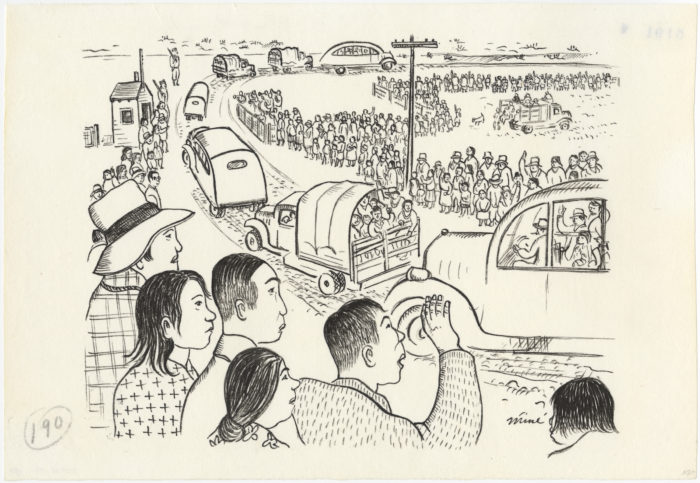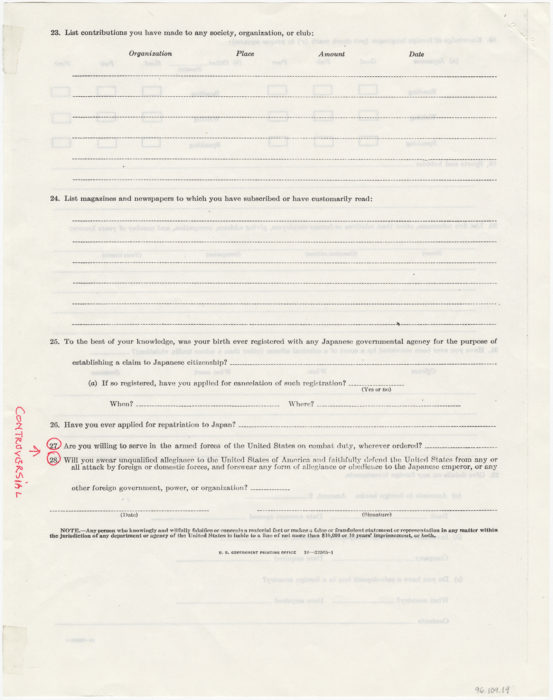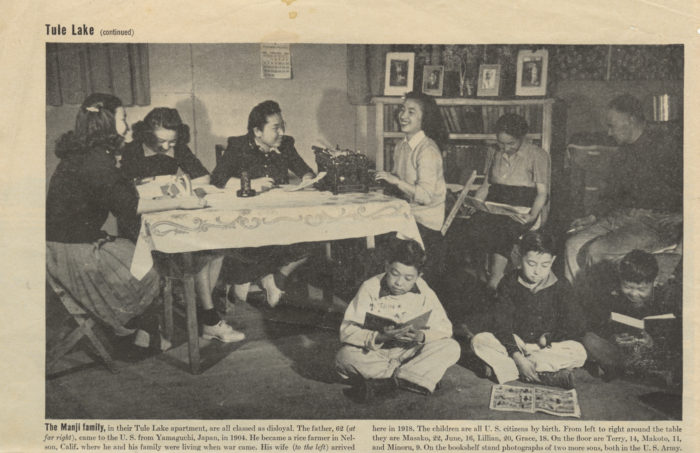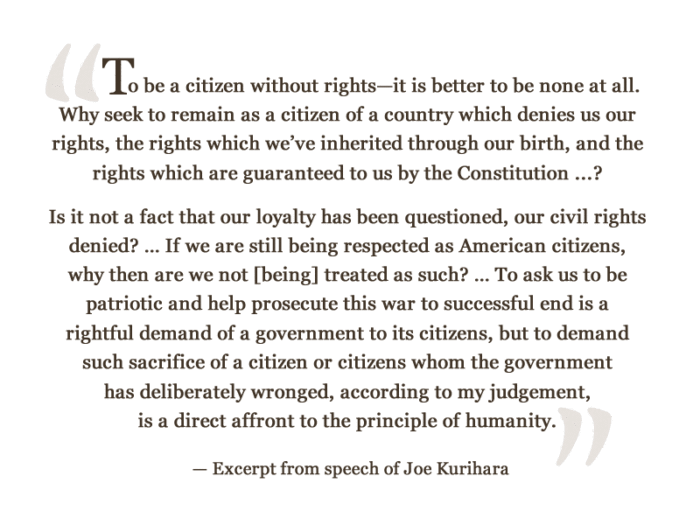A Community Divided

Miné Okubo, Untitled (Departure and segregation of pro-Japanese to Tule Lake, Central Utah Relocation Project, Topaz, Utah, 1942–44), c. 1942–44, ink on paper. Japanese American National Museum, Gift of the Miné Okubo Estate (2007.62.197)
Click to open full-size image in new tab.Look carefully at this drawing by Miné Okubo. Examine all the details in the foreground, middleground, and background.
- What is depicted in this drawing?
- Where might all the people in the vehicles be leaving from?
- Where might they be going?
- How would you describe the expressions on the faces you see?
- What questions do you have about this image?
In her book Citizen 13660, originally published in 1946, Ms. Okubo wrote the following about her image:
The program of segregation was now instituted. One of its purposes was to protect loyal Japanese Americans from the continuing threats of pro-Japanese agitators. Tule Lake, one of the ten original centers, was chosen as a segregation center for the disloyal. In the fall of 1943 thirteen hundred Topazians (about one tenth of the total) were sent there. The group included all who had said they wished to return to Japan; the “no, nos,” that is, those who would not change their unsatisfactory answers to the questionnaire when they were given a chance to do so; all who remained under suspicion of disloyalty after investigation by the War Relocation Authority and the Federal Bureau of Investigation; and close relatives who would rather be segregated with their families than separated from them.
Whatever decision was made, families suffered deeply.

Loyalty questionnaire, 1943, Japanese American National Museum, Gift of Frank S. Emi (96.109.19)
Click to open full-size image in new tab.This is a page of the loyalty questionnaire administered to Japanese Americans while they were imprisoned in concentration camps. Take a look at questions 27 and 28.
Imagine if you were a young American citizen of Japanese descent incarcerated in a concentration camp and presented with these questions.
- How would you respond?
- Why would you respond in this way?
- What questions or concerns would you have?
The War Department and the War Relocation Authority (WRA) scored the answers to the loyalty questionnaire by ranking them according to Americanness and Japaneseness. Especially problematic were questions 27 and 28. Question 27 asked if Nisei men were willing to serve on combat duty wherever ordered and asked everyone else if they would be willing to serve in other ways, such as joining the Women’s Army Auxiliary Corps. Question 27 was an insulting question to some who were angry about being incarcerated. Question 28 asked if individuals would swear unqualified allegiance to the United States and forswear any form of allegiance to the Emperor of Japan. The problem this question posed was that Issei were not allowed to become American citizens—if they forswore allegiance to the Japanese emperor, they would become stateless, without any connection to a government; and the Nisei, who were American citizens, never had any allegiance to the Emperor of Japan.
At most of the incarceration camps, Japanese Americans answered “yes” to both questions 27 and 28. However, many were uncomfortable making this agreement to serve in the military at the same time that the US government was suspending their constitutional rights. For this reason, there were some who answered “no” to both questions. Labeled as disloyal, they were sent to the Tule Lake Segregation Center.

LIFE Magazine Vol. 16, No. 12 (March 20, 1944), Japanese American National Museum, Gift in Memory of Hugo W. Wolter (97.329.96)
Click to open full-size image in new tab.Without reading the caption, look closely and answer the following questions:
- How would you describe the individuals in this photograph?
- What things do you see in the space they are in?
- Can you guess where this photograph was taken?
Now read the caption of the photograph.
- Does any of the information surprise you? If so, which information and why?
- How does the caption contrast with the image?
- What message do you think the photographer is trying to convey with this image?

Japanese American National Museum, Gift of Charles and Lois Ferguson (93.3.1)
Click to open full-size image in new tab.- What would you say is the tone of this speech?
- What are the main messages conveyed?
- What can you conclude about Mr. Kurihara based on his words?
- To whom do you think this speech is being directed?
This is an excerpt from a speech written by Joe Kurihara while he was an inmate at Manzanar concentration camp. Mr. Kurihara was born in Hawai‘i and served in the United States Army during World War I. During his incarceration, Mr. Kurihara was an outspoken dissident leader against the US government’s unjust imprisonment of Japanese Americans.
Due to his actions as an agitator, Mr. Kurihara was transferred from Manzanar to Tule Lake, the segregated center for Japanese Americans who were alleged to be disloyal.
Mr. Kurihara’s anger eventually led him to renounce his US citizenship and go to Japan, where he lived out the remainder of his life.

Miné Okubo, Untitled (Departure and segregation of pro-Japanese to Tule Lake, Central Utah Relocation Project, Topaz, Utah, 1942–44), c. 1942–44, ink on paper. Japanese American National Museum, Gift of the Miné Okubo Estate (2007.62.197)
Click to open full-size image in new tab.As evidenced by the artifacts here, the story of Tule Lake is not a simple one. In July of 1943, Tule Lake became a segregated camp where only Japanese Americans who were alleged to be disloyal based on their answers to the loyalty questionnaire were sent. Among those designated disloyal were United States citizens, including young children; families who had sons fighting overseas in the US military; World War I veterans; and others.
During this time, Japanese Americans were faced with impossible decisions.
Imagine you are a young person incarcerated in Tule Lake. You are a United States citizen because you were born here; however, your government has imprisoned you and labeled you as disloyal. You are of Japanese ancestry, but maybe you’ve never even been to Japan.
- Would you feel inclined to reject your American citizenship?
- Would going to Japan be a viable option for you?
- If asked to choose between these two countries, would you be able to understand the consequences and make that choice?
- If your family members made the decision to give up their American citizenship and move to Japan, would you go with them or would you choose to remain in the United States?
Return to Citizenship
